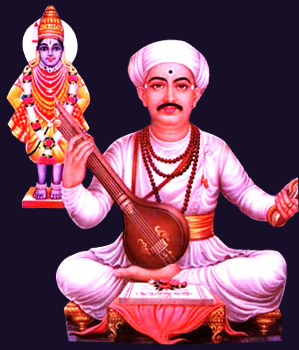 Tukaram preached that the Love of God is not based on rigid caste, creed, education and race standards but on love itself. Born in 1598, in the state of Maharashtra, to an illiterate farmer, Tukaram went on to write some of the wonderful verses in the Marathi languages in the form of Abhangas. He married and had a son but due to a famine, lost both of them due to starvation. Despite these personal tragedies, he never lost the love towards Krishna.
Tukaram preached that the Love of God is not based on rigid caste, creed, education and race standards but on love itself. Born in 1598, in the state of Maharashtra, to an illiterate farmer, Tukaram went on to write some of the wonderful verses in the Marathi languages in the form of Abhangas. He married and had a son but due to a famine, lost both of them due to starvation. Despite these personal tragedies, he never lost the love towards Krishna.
His songs were the spontaneous expression of devotion through singing and dancing of kirtans in honor of Krishna. However, Tukaram faced many problems in his own spiritual quest. One day, when he was prepared to commit suicide, he experienced the divine. From that moment on, his life changed. His philosophy was simple and effective "Sit silently and repeat the name of the Lord. That alone is enough for realization." He constantly emphasized that ethics and orthodox religion like the study of Vedas were just formalities and the real use of religion is in realization of the divine through Love.
In one of his poems he says, `How merciful He is! In those who are helpless He feels His chief delight. He bears their burden on His head; He undertakes the care of acquiring and keeping for them. He endures them not to stray from the path. He takes them by the hand and leads them." Tukaram says, this is the reward if you follow Him with absolute devotion. Though the idea of a second is dispelled, yet Hari remains undiminished: we need not search for His seat outside ourselves. If you desire to know so much, know it by the mind within the mind; know it as the expert hunter knows the signs where gem may be found. First, is the body a reality? Are the correlatives of the body facts? It is a mere scarecrow: it is something that the thief takes for a sentinel. Tukaram wakens a person and cries, "Do not be idly frightened! Open the inner eye, you will find you are in Himself!"









